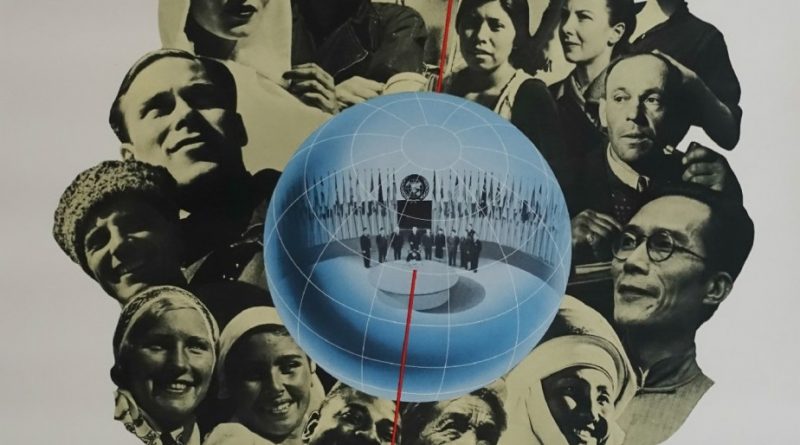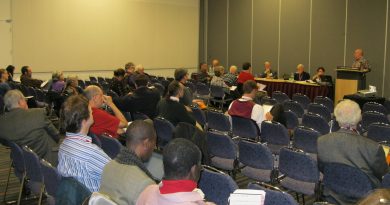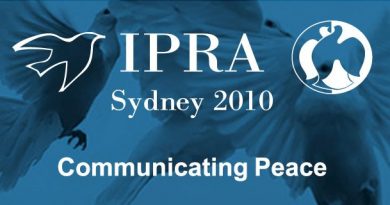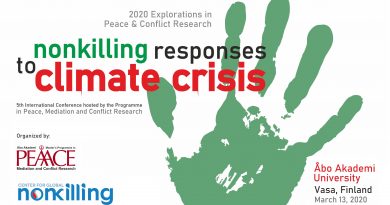How the opportunity for transitioning to U.N. Collective Security was missed for the first time
The 11th issue of the Global Nonkilling Working Papers series has just been released, featuring a new essay by Klaus Schlichtmann on “1950—How the opportunity for transitioning to U.N. Collective Security was missed for the first time”.
In 1950, at the time of the Korean crisis, the UN, under the leadership of the United States was united to counter the aggression of the North. In this situation Russia made it a condition that it would join forces, if the UN started transitioning to genuine collective security, in accordance with the relevant provision in the Charter. What actually was the idea of the transition, and what did the Russians expect, e.g. of the Germans and the French, with regard to the peace clauses that French and German socialists had succeeded to write into the countries’ new constitutions. What were the consequences of the decisions made at the time?
All issues can be downloaded for free in PDF at the Center’s website or purchased in print for US$ 6. Following the Center’s mission of “promoting change toward the measurable goal of a killing-free world”, the Global Nonkilling Working Papers series are dedicated to theory and research incorporating original scientific works that tackle issues related to the construction of nonkilling societies, where killing, threats to kill and conditions conductive to killing are absent.
The collection, launched in cooperation with the Asian World Center at Creighton University, is published on an occasional basis as texts are delivered by authors and reviewed by the Nonkilling Research Committees. In the near future, the Center intends to launch one issue per month, allowing a constant flow of information and new debate possibilities among scholars and practitioners of all fields.
- Download «Global Nonkilling Working Papers #1: "Are Humans Inherently Killers?"» [187.28 KB]
- Download «Global Nonkilling Working Papers #2: "Examining Domestic Violence as a State Crime: Nonkilling Implications"» [185.90 KB]
- Download «Global Nonkilling Working Papers #3: "Nonkilling Global Political Science: A Critical Evaluation"» [393.30 KB]
- Download «Global Nonkilling Working Papers #4: "Socioeconomic Democracy: A Nonkilling, Life-Affirming and Enhancing Psycho-Politico-Socio-Economic System"» [1.78 MB]
- Download «Global Nonkilling Working Papers #5: "The Mark of Cain: A Depth Psychology Commentary on the Nonkilling Paradigm"» [144.38 KB]
- Download «Global Nonkilling Working Papers #6: "Gandhi’s “Soul Force” and Paige’s “Software” for a Nonkilling Society"» [116.54 KB]
- Download «Global Nonkilling Working Papers #7: "Political Art and Craft: The Story of Nonkilling Global Political Science"» [528.01 KB]
- Download «Global Nonkilling Working Papers #8: "Nonkilling Political Leadership"» [178.16 KB]
- Download «Global Nonkilling Working Papers #9: "Ethnicity and Nation Building in Contemporary Africa: A Perspective for Nonkilling"» [196.25 KB]
- Download «Global Nonkilling Working Papers #10: “The Nature and Character of Nonkilling Global Political Science”» [308.42 KB]
- Download «Global Nonkilling Working Papers #11: “1950—How the opportunity for transitioning to U.N. Collective Security was missed for the first time”» [454.81 KB]
- Download «Musicking and Nonkilling for Peacebuilding Conference Program» [1.39 MB]
- Download «Nonkilling Anthropology» [2.21 MB]
- Download «Global Nonkilling Working Papers #12: “Geopolitical and Personal Nonkilling Choices in Times of Collapse”» [518.99 KB]
- Download «Peaceful Societies» [1.84 MB]




